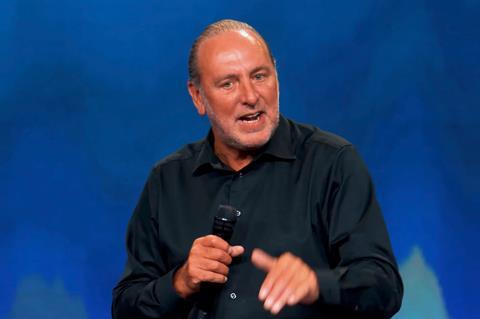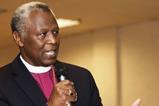The Hillsong founder is one of many Christian leaders who appear to have brushed off past scandals, and made a quick return to the pulpit. But when serious misconduct is unearthed, should church leaders be restored to ministry? Tim Wyatt investigates

Two years ago, Brian Houston was the global senior pastor of the Hillsong empire. He oversaw a megachurch network which boasted hundreds of sites in more than 25 countries. He was an in-demand international speaker. His wife Bobbie – who had co-founded their first church plant in a Sydney suburb in 1983 – and several of their children were deeply embedded in Hillsong ministries alongside him. And then it all fell apart.
First, Houston was charged with failing to report historic child abuse carried out by his own father, also a pastor, when he became aware of the crimes in the 1990. Then it emerged complaints had been made against the pastor for sending inappropriate text messages to a younger member of staff, and for drunkenly spending a mysterious 40 minutes inside the hotel room of a woman while attending a Hillsong conference. Meanwhile, a string of highly critical documentaries on Hillsong were released, accusing the megachurch of exploiting unpaid volunteers working 12-hour shifts while its celebrity pastors lived the high life off church donations. Eventually, the pressure became too great and Houston was forced into quitting his role, accusing Hillsong of “losing its soul” as he went.
After his resignation the hits kept coming, with an Australian MP last year lodging evidence in parliament about tax evasion and fraud at Hillsong and lavish spending of church funds by the Houstons on private jets, luxury holidays, and designer clothes. Although Houston was cleared last year in his Australian criminal trial of covering up his father’s abuse, many assumed the beleaguered pastor would hunker down to ride out the storm of scandal and criticism which now surrounded him. But Houston appears to have had no such plan.
Within months of stepping down from Hillsong, he was travelling and preaching, especially in the United States. In November 2022, he apologised in a video posted online for doing things which were “unbecoming for a minister of the gospel” but rejected the label of “disgraced pastor” and insisted “the best was yet to come”. Throughout 2023 he continued speaking at churches across the world.
At the beginning of this year, Houston posted a video on his hopes for 2024. “God will restore what the Devil has stolen,” he insisted, and announced his next venture – an online church initiative where he and Bobbie would preach and minister every Sunday via their new website. He also continued to encourage other church leaders to contact him so he could mentor them, strategise with their teams and preach to their congregations.
The pastor’s daughter and son-in-law Laura and Pete Toganivalu, who Houston has said he was training to take over Hillsong from him one day, are now instead planting their own church in Sydney, which has also received copious praise and promotion on Houston’s social media channels. An autobiography is also in the works, he revealed in March.
Visitors to brianandbobbie.com are offered hundreds of words extolling the Houstons’ achievements in building the Hillsong empire and the “powerful imprint” their ministry has left. The website then simply notes that “Pastors Brian and Bobbie are now moving into their next phase of ministry”. The only hint of past scandals comes in the final sentence of the bio page and it is typically pugnacious and unrepentant: “As many observing their lives would attest, they have endured and persevered amid uncanny opposition and persecution, yet they remain unshaken and focused when it comes to the things of God.”
What to do with fallen leaders
Houston is far from the first Christian leader to brush off a fall from grace or scandal and simply continue. And it is clear he remains a beloved figure in many parts of the evangelical and Pentecostal world, as the steady stream of preaching invites from churches big and small demonstrates. But his breezy refusal to step back from ministry despite his high-profile failings at Hillsong underlines the confusion within the church about what to do with ‘fallen’ leaders.
Some argue for a one strike and you’re out approach, such as the American pastor John MacArthur. Last year, he condemned the restoration to ministry of a pastor who admitted to having an affair after just a year of counselling. “Some kinds of sin irreparably shatter a man’s reputation and disqualify him from a ministry of leadership forever because he can no longer be above reproach,” MacArthur wrote. Forgiveness and reconciliation was possible only to bring a leader back into the fellowship of a church, but never to return to the pulpit.
Others point to passages such as 1 Corinthians 5, where Paul urges the church to expel a member who was sleeping with his step-mother as support for this idea. John Piper has written that while forgiveness can come immediately after confession and repentance of a leader’s mistakes, trust takes much longer to restore. While it was not in theory impossible for fallen pastors to return to ministry, he advised anyone in this position to quietly find another non-church job. “There are so many who fall who insert themselves quickly in another kind of ministry,” he wrote. “And that’s just, I think, an evidence that they don’t fathom what has happened.”
But others dismiss this hard line standard as incompatible with a gospel of grace, or even the church lapsing into an un-Christian cancel culture. Many point to the story of Jesus restoring Peter after he had denied him three times after his arrest. And Peter was clearly not solely restored into the fellowship of Jesus’s followers but given refreshed leadership responsibilities by Christ despite his shocking betrayal merely days earlier. What everyone on this side of the argument seems to agree on is that there cannot be a one size fits all approach.
Submission
A British expert in training church leaders (who did not want to be identified given the sensitivity of the subject) quoted 1 Timothy 3, where Paul says potential deacons should be tested before being allowed to serve. “Anyone who is unwilling to be tested and let others be the arbiters de facto should not be in ministry,” said. “Nobody gets to be their own referee on this, or to choose their own referees.” Other considerations were had the leader lost the trust and confidence of the congregation in a way which could not be undone, and was their particular sin or failing something they had understood, clearly repented from, and would not repeat.
Another important consideration was staying within the original church body, or at least submitting to their judgement when it was right to begin leading again. Very often, pastors who fall into scandal or sin resume ministry in a new context. While Houston has said he is “submitted” to un-named experienced Christian leaders, his new globe-trotting itinerant preaching ministry outside of Hillsong makes it difficult for anyone to hold him accountable and work through the problems which brought him down.
Mark Driscoll, who famously crashed and burned out of the Mars Hill megachurch following accusations of bullying and misuse of church funds, promptly began a new church plant hundreds of miles away from his former community and elders. Closer to home, Mark Bailey – the head of New Wine and a vicar in Cheltenham – was suspended by the Church of England in 2016 for two years after admitting to an affair. In 2019 he picked up the baton by becoming lead pastor of a different church, just a few miles outside Cheltenham. This was an independent church, which later joined the Vineyard in 2023. A Vineyard spokesperson said, “There was a rigorous process led by a Senior member of our national leadership team to ensure that repentance had happened, behaviour had been addressed and therefore restoration was possible and, within this, that they met the criteria for leadership. Only when this process was completed to our satisfaction, was it deemed appropriate for them to be considered as suitable candidates to enter into the process of adoption to the Vineyard.”
The British leadership expert said they were aware of other circumstances where, “people have been dismissed from a ministry and gone after a short period to join one or set up another, with no reference to the elders of the church they have left, who would have counselled against it.” This meant accountability was basically impossible.
Second chances
But some churches take pride in bringing fallen leaders back into the fold, arguing it powerfully models the core tenet of the faith – that nobody is beyond forgiveness and redemption. Carl Lentz, who was fired by Houston from leading Hillsong’s New York church in 2020 over an extramarital affair, was hired onto the staff team (in a strategic rather than pastoral role) of the Transformation megachurch in Oklahoma three years later. Transformation told the press at the time the hiring underlined their belief in God’s ability to transform and change people. The church also said Lentz had first spent two years “in his own discovery and healing process” before being ready to return. “We believe in Carl, his marriage, his skill set, and his restoration,” the church’s executive pastor said.
Another American megachurch pastor fired by his board for alcohol and marriage problems, Perry Noble, literally called his next plant Second Chance Church. Houston himself has pushed this angle often, including in a clip of a recent sermon he posted online: “Don’t ever doubt the restorative power of God. You say well I messed this up! Well… open your heart to a restorative God.”
Taking time out is a key consideration. Even those who do believe fallen leaders can be restored to the pulpit argue this cannot be immediate and should, depending on circumstances, take years or even decades. Jared Wilson, a pastor and seminary professor in the US, argues the prerequisites for full rehabilitation are “godly grief” (which is prominent in the account of Peter’s restoration) and the slow discernment and testing over time by a broader group of wise Christians whether the leader is truly repentant and has grown beyond their mistakes. Of course, it is perhaps this which is most challenging for those – such as Houston – who have spent their entire careers on stage, in the limelight, leading churches and preaching. “Ministry is what I was born for,” the pastor recently posted online. “Helping people, growing people, leading people.”
With so many of these cases, it is impossible to come to definitive conclusions about the wisdom or otherwise of a fallen leader resuming ministry. We cannot know either their own hearts or what private conversations have been had between them and experienced Christian elders to whom they are accountable. And therefore we cannot know from the outside if they should have remained in quiet obscurity, or if it they have genuinely repented, restored broken relationships, fixed unhealthy habits and are ready to serve once more.
Premier Christianity invited Brian Houston to comment on the issues raised in this article, but has not received a response





































3 Readers' comments